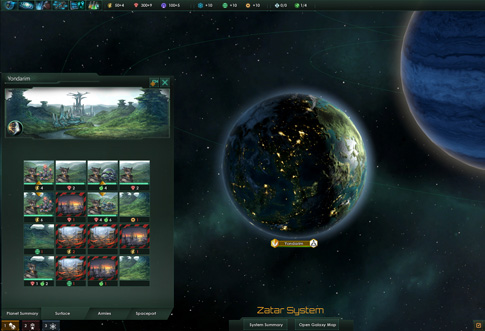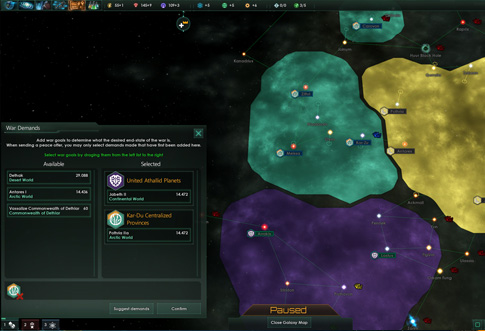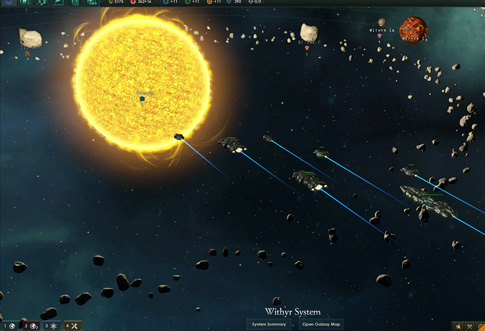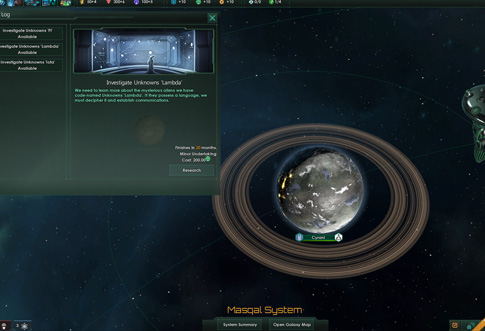Stellaris Game Review

Deep & Varied Exploration.
Enormous procedural galaxies, containing thousands of planets.
Explore Anomalies with your heroic Scientist leaders.
Infinitely varied races through customization and procedural generation.
Advanced Diplomacy system worthy of a Grand Strategy Game.
Ship Designer based on a vast array of technologies.
Stunning space visuals.
Tweaked in the correct manner, Stellaris has an opportunity to become an enduring classic. At the moment, it does not fulfill its full potential.
None of which will be to say Stellaris is a bad game, only an inconsistent one. Given Paradox's history, expect coming patches and expansions can fill in the gaps, and smooth out the omissions and strange quirks of diplomacy.
About The Game
Stellaris’s early game is a remarkable game. You will be the ruler of the empire of mammals, avians, fungoids, or any one of several other strange, strange lifeforms, are set free to investigate and find the galaxy. It is mysterious and very alluring game. You have to choose your science ship and send it away to neighboring stars, scanning each to find new life and new civilizations. These are the voyages of the USS Spacey McSpaceface.
As you investigate you will find resources to finance your expansion, which could be picked by constructing mining stations. You’ll discover anomalies, which could be studied to uncover new technologies and cause quests. You will meet other species, frequently friendly but occasionally not. And, when you are not venturing into the unknown, you will look after the needs of your home planet, building buildings for the citizens to work. Sid Meier once called a strategy game some interesting choices, and Stellaris’s opening hours are packed full of them.




Game Features
That Stellaris gameplay is not turn-established creates a fluidity to the activity. As with Paradox’s preceding grand strategies—such as Europa Universalis IV or Crusader Kings II—Stellaris game transfers in real time, but with the choice to pause, slow or fast forwards.
Paradox has a reputation for creating impenetrable systems. Before Stellaris, the studio’s most accessible game was Crusader Kings II – a medieval soap opera that still needed a fundamental understanding of feudal politics to efficiently play. Historic quirks aside, however, these games seldom need complicated interactions. With Stellaris, the same holds true. The difference here is the demonstration and UI, which work overtime to make things simple to parse.
Scientific research even offers a random component. Rather than the usual observable tech tree, each research division—biology, physics and engineering—offers three possible research alternatives. The tech tree is there, but it is not repaired. Develop an early laser weapon, and the next set of choices may present another grade, or may offer three completely distinct choices. At times, it can feel arbitrary, but it is a powerful means of driving your improvisation. And occasionally you have jumped up the tech tree—offered special, infrequent research opportunities that can provide you an important edge.
As you continue to expand and research, you stumble across competing empires. Eventually, there is a tipping point, as your familiarity with the galaxy enlarges to contain its leading players. The fundamental form of galactic politics starts to show itself, and quest gives way to diplomacy and conquest. Sadly, this point indicates an important shift in Stellaris’s rate. That unrelenting sequence of second-to-second choice and result instead becomes languid and restrictive.
The two success conditions are possessing 40% of the galaxy’s colonizable worlds or subjugating all of its empires. A galaxy is a busy place, and so both need military action. As the citizens of my avian empire would say: you can not make a space omelet without breaking a few space eggs. Including aggression, If you settled into a rhythm of declaring war, taking some land, and appeasing the captured planets in time for another major battle. It created a mid-game of peaks and troughs, with unexpected fits of action punctuating long years of economic and military growth.
To an extent Stellaris for not including science or culture successes—win states in which the whole galaxy ceases to recognize your insurmountable greatness. However, while contrived, such success states are inelegant solutions to some problem Stellaris does not conclude. 4X games are not endless, and so it is great to supply finishes that tailor to each unique play style.
Stellaris is not only a 4X, however. It is just as much a grand strategy, a genre that favors a more sandbox style of effort. Games for example Europa Universalis 4 or Crusader Kings 2 do not have an apparent success to strive for. They are alternate history fan fiction, at which narratively appears from both your successes and failures on the way. Finally, Stellaris sits awkwardly between the two fashions. It has specific, quantifiable success states, but they greatly favor a particular kind of play.
A result of this is that diplomacy feels quite incompetent. Yes, deals are made and vows signed—migration accessibility, which lets people freely go between two empires, is a particularly nice touch. Once an AI coalition is locked in, they are BFFs for life. It was especially galling in one case after trying to court two empires in an alliance with each other.
However, a galactic standoff between small, competing coalitions and federations has the possibility to be exciting. Sadly, it was not. Within an attempt to shake up the end game, Stellaris can activate one of quite a few galactic disasters—in my instance an outside danger that threatened to engulf the whole galaxy. For some time, it looked serious. This new faction—the Unbidden—was expanding at an alarming speed, wiping out numerous present empires. Their increase ceased just as abruptly, but their continuing existence negated any aggression in the AI empires.
The Unbidden’s existence gives me a 200 view modifier with every empire in the game. The view buff has another, more pernicious effect. Each empire you strike stays cordial with me after peace is declared. Precisely the same holds true of relationships between other empires. It’s been decades since an AI player last declared a war.
The diplomacy commerce display enables you to negotiate for the right to send military boats through another player’s land. That would work, but only empires you share a border with will ever consent to this kind of deal.
The early game is packed saturated in character, but it is squandered as the hours roll on. Perhaps a poor late-game encounter—the arbitrary nature of each effort indicates many possible consequences. But the glacial tempo feels deliberate, and the long intervals of inaction bring other restrictions to the fore. How most research is just a stat boost, with just a short few technologies advancing the storyline in interesting, creative ways. How presidential nominees have so few mandates, regularly cycling between only two fundamental goals. How espionage is an apparent omission, particularly when a powerful fight is so dependent on tips.
Game Trailer
In order to have more insight into this game, you can watch this video from the following link:
You can visit the website of the Stellaris game review to understand the game more.


























































































































































